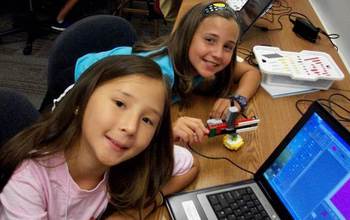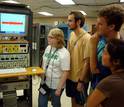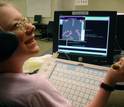News Release 13-200
Increasing accessibility to computer science education across the U.S.
NSF awards to researchers, educational partners and teachers bring innovation to CS education

Girls from the Georgia Computes! summer camp learn computer science.
December 13, 2013
This material is available primarily for archival purposes. Telephone numbers or other contact information may be out of date; please see current contact information at media contacts.
Grace Hopper--computer pioneer, Navy rear admiral, and inventor of one of the first computer languages--was born on Dec. 9, 1906. To honor her life and achievements, in 2011 Congress inaugurated Computer Science Education Week (CS Ed Week), which encourages individuals of all ages to learn more about computer science and its important role in an increasingly computational and digital world.
When one thinks about computer science, images of a lone programmer might spring to mind, but computer science (CS) is about more than just coding. Computer science also includes problem solving, creativity, and abstraction. Whether designing artificial limbs, analyzing medical data to develop more effective treatments, or understanding the potential impact of impeding severe weather, computational competencies are empowering.
"It's never been a more exciting time to be involved in computer science," said Farnam Jahanian, head of the Computer and Information Science and Engineering directorate at the National Science Foundation (NSF). "It is highly creative, highly interactive, and has enormous possibilities for changing the world."
Computational skills are also in high demand in the workforce. Studies indicate the nation creates fewer technologically-prepared workers than are required. According to recent Bureau of Labor statistics, 4.6 million out of 9.2 million STEM (science, technology, engineering and mathematics) jobs will be in computing by 2020. In addition, practitioners in many other fields--biology, chemistry, finance, and medicine, for example--will need sophisticated computational skills.
Who will fill these jobs? Will U.S. workers have the skills and expertise required?
Today, most U.S. schools do not offer academic CS courses. Schools offer courses on how to use technology, but not courses that cover the fundamental concepts and skills of computing. In fact, only 19 percent of U.S. high-school students take a computer science class, a percentage that has fallen over the last two decades.
Moreover, women, African-Americans, Latinos, Native Americans, and individuals with disabilities take CS courses in astonishingly low numbers. These individuals constitute 70 percent of the nation's population and their underrepresentation in CS represents a loss of talent and creativity for our nation.
Fixing this imbalance is daunting, but not insurmountable, according to Jan Cuny, NSF program manager for computer education and broadening participation.
"The challenges of underproduction of degrees, lack of a presence in K-12, and underrepresentation for computer science are significant and interrelated," Cuny said. "The computing community has an unprecedented opportunity to affect K-12 education with its enthusiasm and experience, together with its best ideas on curriculum, pedagogy, and ways to engage a broader, more diverse group of students."
Central to NSF's efforts is the CS 10K Project, which focuses on making computer science accessible in high schools. CS 10K is a nationwide effort to get engaging, rigorous academic computer science courses into 10,000 schools taught by 10,000 well-prepared teachers. The project pays careful attention to the inclusion of women and minorities--groups that have been traditionally underrepresented in computing.
Reimagining the curriculum
NSF has funded the development and implementation of two new computer science courses--Exploring Computer Science (an introductory course intended for all students) and CS Principles (to be a College Board Advanced Placement course starting in the fall of 2016). Both courses are designed to be engaging to diverse student populations, teach the fundamental concepts and big ideas of computing along with coding, and inspire students with the creative potential that computing has for transforming society and addressing complex problems across many disciplines. NSF has funded the development of materials, assessments, and curricula for these courses.
Building CS capacity
According to experts, there are far too few qualified computer science teachers currently working in U.S. schools. Where CS classes are taught, the instructors are often trained in other STEM fields. Through CS 10K, hundreds of teachers have been trained, and courses have been piloted in cities across the country, including in Los Angeles, San Jose, Chicago, New York City, and Washington, D.C. Other STEM organizations, industry and nonprofits, including Code.org, the College Board, the National Math and Science Initiative (NMSI), Teach for America, and Project Lead the Way, have begun to run pilots as well.
Respecting the skills
The fact that CS classes are not mandatory and often do not count toward STEM requirements provides another obstacle to students taking computer science. Thirty-seven states don't allow students to count CS toward their high school graduation requirements. However, more and more states are accepting the importance of CS education and integrating it into standard coursework.
This effort scored a number of victories this week. The City of Chicago announced it would include computer science as part of its core curriculum and the Alabama State Board of Education approved a motion that will allow two courses--Computer Science Principles and Advanced Placement (AP) Computer Science A--to officially count as math credit for high school graduation. Similar efforts are taking hold nationwide as more educators realize the value of teaching the principles of CS beyond word processing and content creation tools.
Starting early
Growing evidence suggests it is necessary to expose students to computer science even earlier in their learning. For that reason, NSF is funding efforts to develop approaches to integrating CS education, especially computational thinking, into middle- and elementary-school curricula, to study what works and to help creative teachers scale up and disseminate their ideas.
As President Barack Obama said in a video message to the nation at the start of CS Education Week, "Learning these skills isn't just important for your future--it's important for America's future."
Advances in computer science and information technology (IT) underpin our economic prosperity. Since 1995, networking and IT industries accounted for 25 percent of U.S. economic growth and in 2010 alone, IT industries grew 16 percent and contributed 5 percent to the overall U.S. GDP.
"We hope that teachers, parents, and school administrators use the interest and excitement generated by this year's CS Ed Week celebration and the Hour of Code to build momentum for introducing quality computer science courses at their schools," Jahanian and Tom Kalil, Deputy Director for Technology and Innovation at the Office of Science Technology Policy, wrote in a recent White House blog post. "Let's give our students the skills they need to shape the technology that's changing the world!"
Below are a handful of projects and partnerships currently funded by NSF that seek to improve the high school CS education ecosystem in the U.S.:
-NSF-
-
A group of students gathers around a rack of scientific equipment.
Credit and Larger Version -
A student in a wheelchair computes using an adaptive keyboard.
Credit and Larger Version
Creating the AP Computer Science Principles course
To help ensure that more high school students are prepared to pursue postsecondary education in computer science, NSF made a four-year, $5.2 million grant to the College Board's Advanced Placement Program® (AP®) in 2013 to fund the creation of AP Computer Science Principles (AP CSP). The college-level AP CSP course will be introduced into thousands of high schools nationwide in fall 2016, with the first AP CSP Exam to be administered in May 2017. Unlike computer science courses that focus on programming, AP CSP has been designed to help students explore the creative aspects of computing while also providing a solid academic foundation for understanding the intellectual concepts and practical contributions of computing. AP CSP includes a curriculum framework designed to promote learning with understanding, a digital portfolio to promote student participation throughout the year, and a course and assessment that is independent of programming language.
FRABJOUS
The University of California, Berkeley and North Carolina State University are working on a collaborative effort, called FRABJOUS, to develop and deploy a proposed, new Advanced Placement (AP) computing course that can successfully achieve outreach--attracting women and underrepresented minorities--while having a technically rigorous programming component. The work extends previous work on the Berkeley "Beauty and Joy of Computing" course and the College Board's CS Principles course to the high school level, addressing the development and study of new instructional materials as well as the impact of teacher professional development on student learning outcomes.
Using mobile learning to teach CS principles in Connecticut schools
Trinity College, in partnership with the Hartford Public School System, the Connecticut Chapter of the Computer Science Teachers Association, and other Hartford area high schools, will train approximately 30 Connecticut high school teachers to teach Advanced Placement (AP) computing courses in Connecticut high schools that currently do not teach AP computer science. The course will be based on a mobile Computer Science Principles curriculum, Mobile CSP, which uses the new mobile computing language, App Inventor for Android, to provide a rigorous, programming-based introduction to computational thinking. The main research question addressed is whether the Mobile CSP curriculum is an effective way to teach CS Principles and whether it can serve as one model to help train teachers for the CS 10K project. The curriculum is project-based and takes a constructionist approach to learning computing. Student projects focus on building socially useful, place-based mobile apps. In this way, student learning is associated closely with their interests and grounded in their schools, homes, and communities.
Teach for America
With support from NSF, Teach For America (TFA) is conducting a pilot program at five New York City public high schools in 2013-2014 to develop a new model for recruiting and training teachers to effectively teach Exploring Computer Science. The pilot tests a novel model for pre-service teacher recruitment and professional development that contributes to the CS 10K initiative. Students in the participating high schools that currently lack CS courses and CS teachers are directly affected. In addition, the pilot will inform the expansion of CS courses within New York City and throughout high schools in other TFA regions around the country. The model of recruiting recent college graduates with CS expertise and training them to be CS teachers also has the potential to inform recruitment strategies of pre-service teachers at other college campuses.
Project Lead the Way
The NSF is funding researchers at Purdue University, in partnership with Project Lead the Way (PLTW), to provide and assess just-in-time professional development for teacher knowledge growth in computer science. The project creates and implements a high-quality professional development approach that incorporates face-to-face training coupled with continuous online just-in-time support at a large-scale. It also assesses the effectiveness of professional development at improving teachers' knowledge, skills, and attitudes for teaching computer science. PLTW is a non-profit organization that has successfully implemented innovative and rigorous STEM curriculum in over 4,700 schools and trained 10,500 STEM teachers across the United States. PLTW is introducing a new Computer Science and Software Engineering (CSE) course, which aligns with the CS Principles framework.
The Games Network: games for students, games by students
Harvey Mudd College proposes to address student misconceptions about computing by engaging middle school students in a semester-long software development project carried out by college students. The goal of the software project is for middle school students to build an educational computer game. Through the program, middle school teachers, regardless of technical competency, engage their students in devising technological tools for their own learning. It also provides a context for authentic communication between middle school and college students, which may motivate and improve foundational literacy as well as content-related vocabulary. The program delivers concrete benefits to middle school and college faculty and students that are unrelated to computer science recruitment, while at the same time fostering interest in the field.
STARS Computing Corps
The STARS (Students & Technology in Academia, Research, and Service) Alliance is a national community, led by the University of North Carolina at Charlotte, which uses regional partnerships to broaden the participation of women, under-represented minorities, and persons with disabilities in computing. STARS is a collaboration among 50 universities and colleges, each the center of their own regional alliance of K-12 schools, community colleges, industries, and community organizations. Its centerpiece, the STARS Computing Corps, is a framework for integrating engagement into computing departments for recruitment and graduation of undergraduate and graduate students. Corps students collaborate with regional K-12 schools, industry, and community partners to inform, engage, and prepare upcoming students for entry and success in college computing programs. Through student-led regional engagement that includes outreach to high schools, peer mentoring, team projects, and research experiences, STARS Computing Corps students are emerging as the future innovators of tomorrow.
Media Contacts
Aaron Dubrow, NSF, (703) 292-4489, email: adubrow@nsf.gov
Related Websites
The Games Network: Games for students, games by students: http://www.nsf.gov/awardsearch/showAward?AWD_ID=1042472
CS 10K: Mobile CSP: Using Mobile Learning to Teach CS Principles in Connecticut Schools: http://www.nsf.gov/awardsearch/showAward?AWD_ID=1240841
BPC-A: The STARS Alliance: A Southeastern Partnership for Diverse Participation in Computing: http://www.nsf.gov/awardsearch/showAward?AWD_ID=0540523
BPC-AE: The STARS Alliance: A Southeastern Partnership for Broadening Participation in Computing: http://www.nsf.gov/awardsearch/showAward?AWD_ID=0739216
Collaborative Research: Broadening Participation in Computer Science: AP Computer Science Principles Phase II: http://www.nsf.gov/awardsearch/showAward?AWD_ID=1246951
BPC-AE: Scaling the STARS Alliance: A National Community for Broadening Participation through Regional Partnerships: http://www.nsf.gov/awardsearch/showAward?AWD_ID=1042468
Type I: Collaborative Research: FRABJOUS CS - Framing a Rigorous Approach to Beauty and Joy for Outreach to Underrepresented Students in Computing at Scale: http://www.nsf.gov/awardsearch/showAward?AWD_ID=1346922
S-STEM: STARS Leadership Corps Computing Scholars: Pathways from Community College to Graduate School through Technical Excellence, Leadership, Service-learning and Community: http://www.nsf.gov/awardsearch/showAward?AWD_ID=0965841
The U.S. National Science Foundation propels the nation forward by advancing fundamental research in all fields of science and engineering. NSF supports research and people by providing facilities, instruments and funding to support their ingenuity and sustain the U.S. as a global leader in research and innovation. With a fiscal year 2023 budget of $9.5 billion, NSF funds reach all 50 states through grants to nearly 2,000 colleges, universities and institutions. Each year, NSF receives more than 40,000 competitive proposals and makes about 11,000 new awards. Those awards include support for cooperative research with industry, Arctic and Antarctic research and operations, and U.S. participation in international scientific efforts.
Connect with us online
NSF website: nsf.gov
NSF News: nsf.gov/news
For News Media: nsf.gov/news/newsroom
Statistics: nsf.gov/statistics/
Awards database: nsf.gov/awardsearch/
Follow us on social
Twitter: twitter.com/NSF
Facebook: facebook.com/US.NSF
Instagram: instagram.com/nsfgov




